BetaWeb
Unleash the power of BETA via HTML5 and Javascript
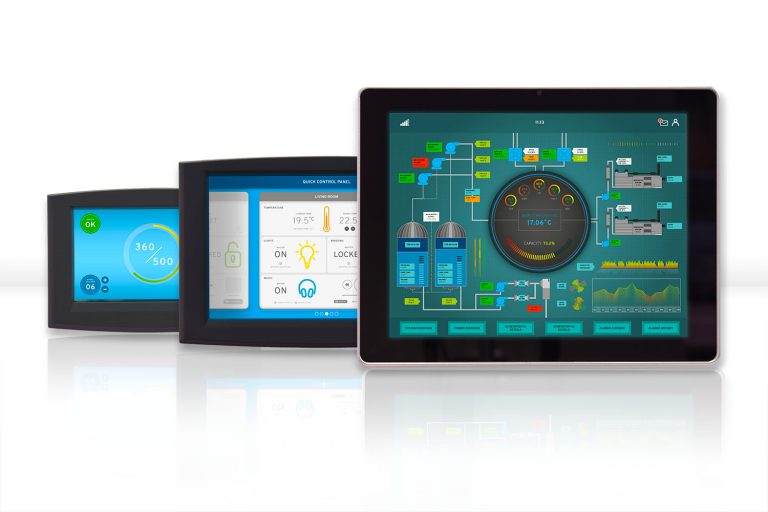
BetaWeb represents a new way to program and interact with embedded systems. If you can design a website you can use BetaWeb to create an embedded kiosk mode HMI.
BetaWeb offers unique features that allow complete systems to be designed and built around Blue Chip Technology’s configurable Beta+TM3 platform eliminating the need for additional embedded electronics, reducing system cost, and accelerating development.
BetaWeb can work both online via onboard Ethernet or Wifi and via locally stored offline webpages or even in a hybrid mode. Onboard 8GB eMMC storage offers ample space for locally hosted pages.
BetaWeb uniquely provides Javascript APIs to enable high speed, low latency access to onboard hardware. 12 local GPIO and a RS232/422/485 UART. A BetaWeb equipped system can monitor and control external equipment directly, eliminating the need for separate electronics or even a PLC.
In more traditional use cases BetaWeb can be paired with a webserver capable RTU / SCADA PLC or Building Management System (BMS) such as, Distech (EC-NET), Honeywell Centraline (Arena), Niagara 4 Jace, Niagara 4 PC Supervisors from Tridium, TONN, Hawk, EC-BOS (3, 6 & 8000) or Trend (IQ Vision).
Hardware accelerated OpenGL and Video Decode opens opportunities for interactive Promotional displays, Virtual showrooms, Product configuration and even EPOS. Remote hosting provides simple estate wide deployment, real time information.
BetaWeb Application Features
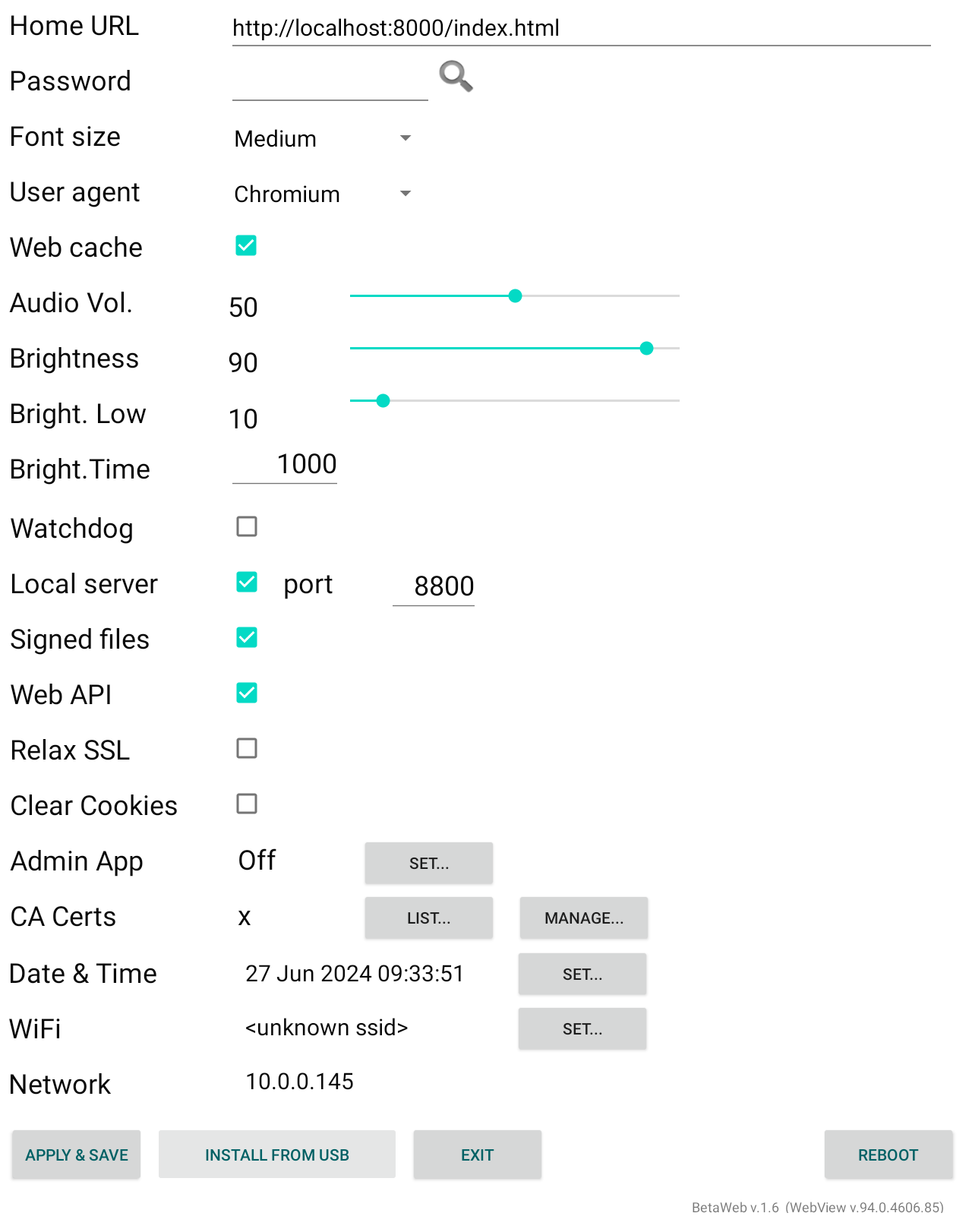
Configuration
Comprehensive configuration options give you control over all the required system setup items via password protected onscreen selections or a configuration stored to a USB drive. Add custom splash screens, control the backlight and timeouts, audio volume, etc
Browser
Android Webview supporting HTML5, Accelerated OpenGL, Accelerated Video Decode
Local webserver server
Design a system user interface in HTML5 and Javascript, install files to the onboard eMMC memory, for the appearance of an embedded system with the convenience of using Web development skills and tools. The full featured, high performance built-in webserver supports: Multi-threaded rendering, Cookies, Encryption and signature of locally hosted web pages.
Secure
Install and maintain security certificates. Optionally encrypt local content to ensure the integrity of local content. The BetaWeb APIs and hardware interfaces are only accessible via localhost, preventing external malicious code controlling local hardware interfaces.
Access on board SBC hardware
The BetaWeb APIs allow HTML5 access to hardware features more commonly associated with low level languages. Simple to use, low latency API’s provide access onboard 3V GPIO, RS232/422/485 directly from your webpages. Monitor and control system components without the need for intermediate hardware. GPIO interfaces can be customised to offer higher voltage and current drive capabilities via the addition of a 50-way expansion hat. SPI, CAN bus, I2C and other interfaces can also be supported on request. Contact Us to discuss your custom requirements. The video demonstrates the ability to read inputs and drive outputs directly from a webpage via BetaWeb’s APIs.
Hardware configurations and options
| LCD | Screen size | 4.3″ | 7″ | 9.7″ | 12″ |
| TOUCH | PCAP Touch | Y | Y | Y | Y |
| Resistive Touch | Y | Y | N | N | |
| MOUNT/BEZEL | Front / Plastic | Y | Y | N | N |
| Front / Metal IP seal | N | Y | Y | Y | |
| Rear / sub-Flush | Contact Us | Y | Contact Us | Contact Us | |
| REAR COVER | Open frame | Y | Y | Y | Y |
| Plastic rear shell | Y | Y | N | N | |
| Custom sheet metal | Y | Y | Y | Y | |
| PROCESSOR | COM+HB or SBC | TM3+HB8 TM3+HB8LT | TM3+HB8 TM3+HB8LT | TM3+HB9, TM3+HB9LT | TM3+HB9, TM3+HB9LT |
| Expansion boards | Y | Y | Y | Y |
Finding the right display is often a balancing act between cost, user experience and physical constraints. With that in mind, we have carefully sourced and tested a range of displays to give you options that make BetaWeb suitable for a variety of systems.
| LCD | 4.3″ | 7″ | 9.7″ | 12″ |
| Resolution | 480×272 | 800×600 | 1024×768 | 1280×800 |
| Backlight | 440cd/m2 | 440cd/m2 | 400cd/m2 | 700cd/m2 |
| Contrast | 500 | 400 | 800 | 800 |
| Viewing angles | 50,70,70,70 | 60,70,70,70 | 89,89,89,89 | 80,80,80,80 |
| Touch | RES & PCAP | RES & PCAP | PCAP | PCAP |
| Interface | RGB | RGB/LVDS | LVDS | LVDS |
Integrating a touch screen to your system is far from simple, the experience needs to be responsive, accurate, and has to be suitable for the end user’s environment.
We offer two popular touch technology choices as part of our BetaWeb HMI, both suited for different situations:
Projected Capacitive
For most applications, a projected capacitive touch screen is suitable. It’s the same interface that’s used in commercial
smartphones where users benefit from a responsive, frictionless touch experience. Our projected capacitive option
supports multi-touch for more advanced user interaction and many work with latex or nitrite gloves.
Resistive
Resistive touch works by responding to pressure on its surface as two sheets of material meet. It’s a cost-effective
alternative useful for situations where end users are wearing gloves and only a single touch point needs to be registered
at any given moment.
The processor board is the brains of your BetaWeb HMI. It takes care of running your software application using the onboard processor. In making your choice, you need to consider two key aspects; the operating system that your application will run on and the required processing power and graphics capabilities to run the application at an optimal level.
| Processor | TM3 |
|---|---|
| Architecture | ARM |
| Processor | Allwinner H6, Quad Core Coretex-A53, 1.4GHz |
| DRAM | 1GB DDR3 2GB DDR4 |
| Storage | 8GB eMMC + onboard uSD |
| USB | 3.0 2.0 |
| Ethernet | 10/100 |
| UARTS | RS232 RS422 RS485 I2C SPI |
| Wifi | bgn/-/5.0 (option) |
| BT Classic/BLE | No/5.0 |
| Carrier board | HB8, HB8LT, HB9, HB9LT |
| Display | HB8 – RGB HB9 – LVDS HDMI |
| Touch | PCAP or RES |
We are very aware our embedded Touch systems need to look great when integrated to your designs. We offer a variety of standard bezel, mounting and rear cover options to help you achieve an integrated look. We are always willing to discuss customisations to give you the finished aesthetic your products need.
As with the LCD and touch interface, it’s important to balance cost, environmental and user experience requirements when
it comes to choosing the bezel for your BetaWeb HMI. BetaWeb provides two options for the bezel surrounding its front panel; either black painted plastic or machined aluminium. Alongside choosing a bezel material, you should factor in your required ingress protection (IP) rating as there are a number of choices available for this, too.
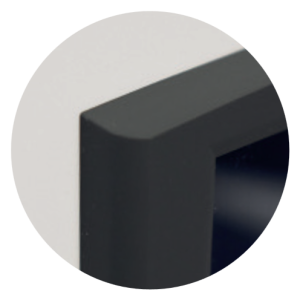
Painted Plastic
For cost-sensitive applications where high-rated IP sealing is not required, our painted plastic option is the one to choose.. The painted finish ensures a premium appearance.
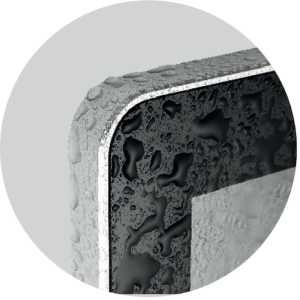
Machined Anodised Aluminium
If your HMI requires significant protection from dust or water and a more rugged frame for harsher environments
– or even just a more premium feel to your product – then choose our machined aluminium bezel. Environmental protection is provided via adonisation, which can be done in almost any colour. Standards, and particularly EMC compliance are integral to every aspect of our designs, highly effective whole product grounding is achieved via selective laser etching of internal surfaces.
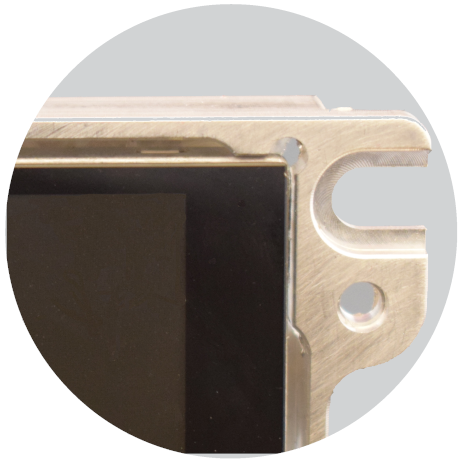
Rear mount sub flush and flush with IP sealing
With full design and manufacturing control of our products we regularly help customers achieve their desired system look and feel. We can readily offer alternative mounting solutions such as the frame shown which provides a near flush rear mount solution. Contact Us for further details and to discuss requirements and concepts.
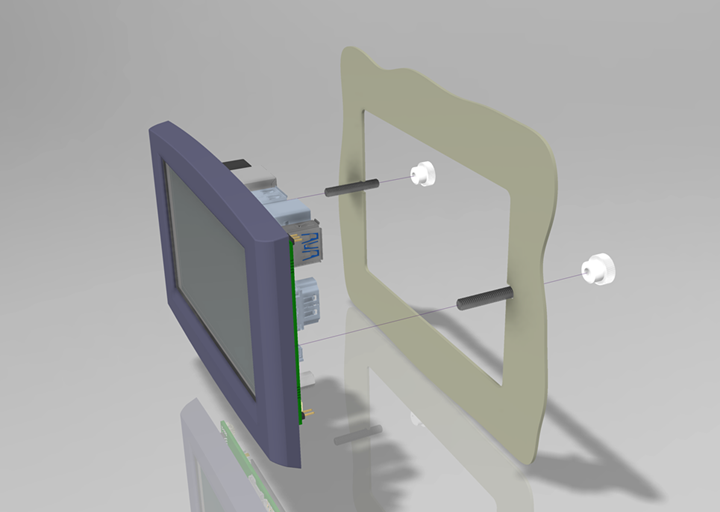 |
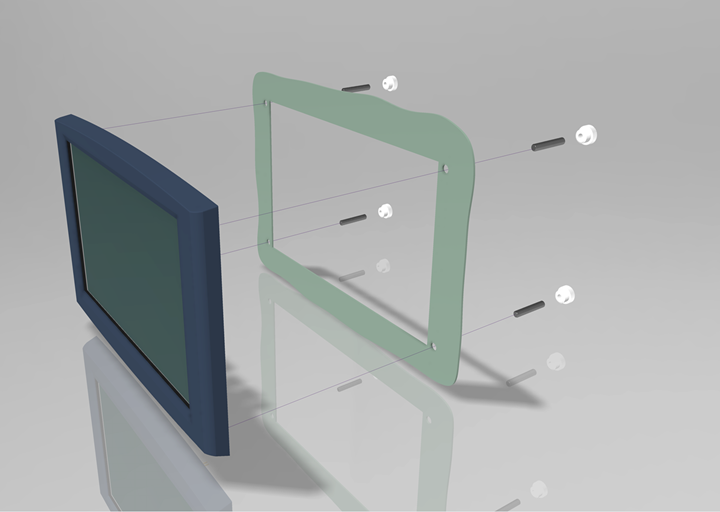 |
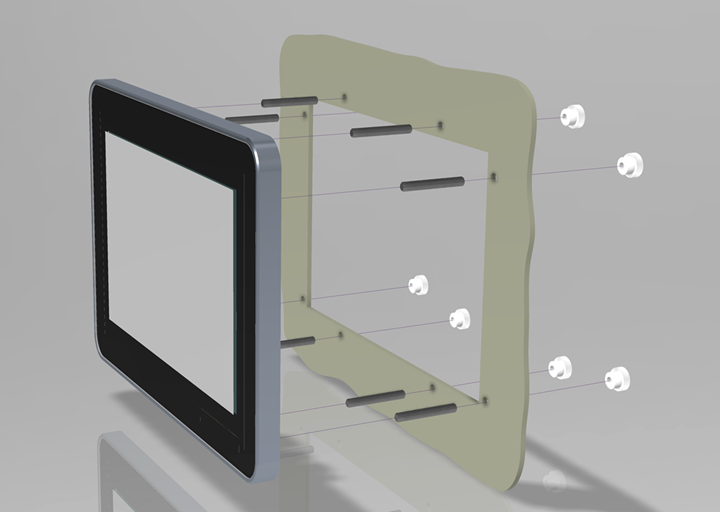 |
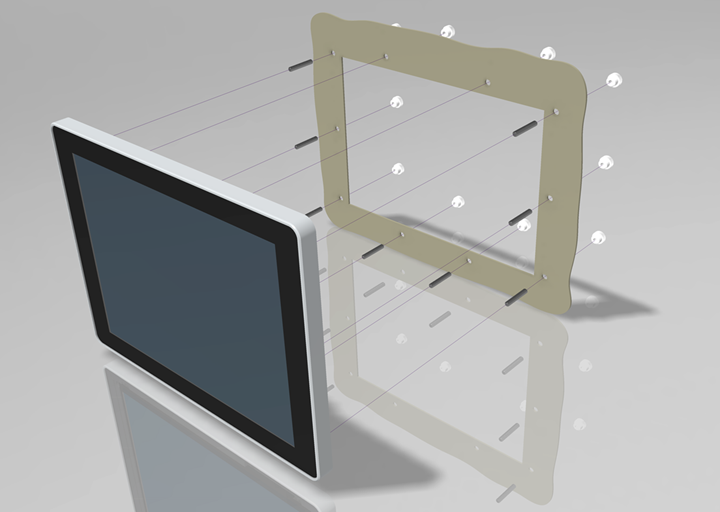 |
 |
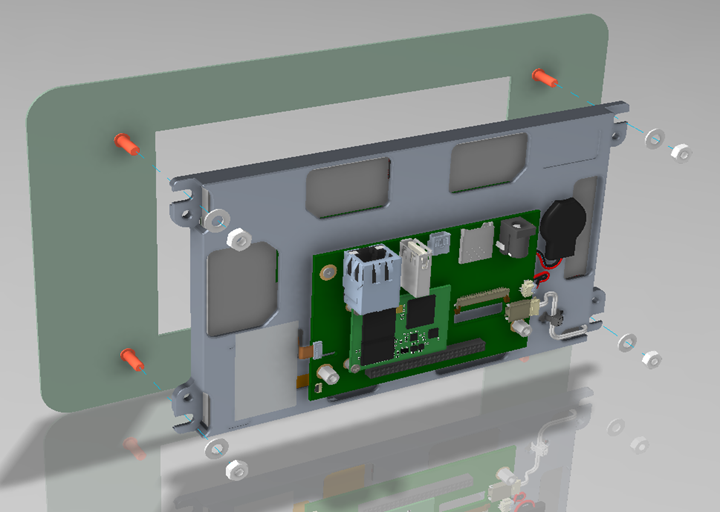 |
Mounting illustrations. (Note many other options are available on request)
Row 1: Front Mount 7″, Front Mount 7″ IP sealed , Row 2: Front mount 9.7″ IP Sealed , Front Mount 12″ IP Sealed, Rear sub flush 7″
We are able to offer either open frame electronics, or a large variety of rear enclosures ranging from injection moulded, sheet metal and machined. Contact Us to discuss your rear enclosure preferences.
| Bezel | Front mount Black Plastic | Front mount IP sealed | Rear mount, sub-flush |
| Rear cover | Open frame | Black plastic rear shell | Custom sheet metal |
| LCD | 4.3″ | 7″ Plastic Bezel | 7″ IP rated | 7″ Rear sub-flush | 9.7″ IP rated | 12″ IP Rated |
| Overall (WxHxD) (mm) | 128 x 87 x 33 | 192.5 x 125.2 x 35 192.5 x 125.2 x 40 (XE1) |
201 x 140 x 35 201 x 140 x 40 (XE1) |
191 x 111 x 33 | 241 x 185.3 x 36 241 x 185.3 x 40 (XE1) |
313.4 x 215.5 x 55 |
| Cutout (WxH) (mm) | 112 x 75 (2 hole) | 160.5 x 98 (4 hole) | 172 x 111 (8 hole) | 155.4 x 94.5 (4 hole) | 200 x 142 (10 hole) | 300 x 191 |
| Mounted depth infront (mm) |
9 | 11.5 | 10.2 | 0 | 12 | 10.2 |
| Mounted depth behind (mm) Minimum (no connections) |
24 | 24 28 (XE1) |
24 28 (XE1) |
33 | 24 28 (XE1) |
45 |
BetaWeb use cases
What is BetaWeb monitoring and controlling today?
Facilities management
Monitoring hygiene supplies levels at a major UK airport – BETA reads local sensors and transmits their data to a server over GSM
Banking
Multi-BETA network manages access control through internal doors and interlocks within a bank building
Marine engine monitoring
Monitoring engine performance on large ships
Oil monitoring
Monitoring contaminants in engine oil
Electrical control
Monitoring and control of a wide range of electrical equipment in real time on emergency vehicles
RV electrical control
Monitoring and control of multiple electrical equipment types in real time on recreational Vehicles
Cosmetic surgery
Monitoring and control of electrical devices on the human body
Oil & gas
Monitoring and control of electronic devices across an oil rig
Industrial access control
Control of large industrial doors
Lighting management
Control of lighting ambience in retail environments
Ask a question

